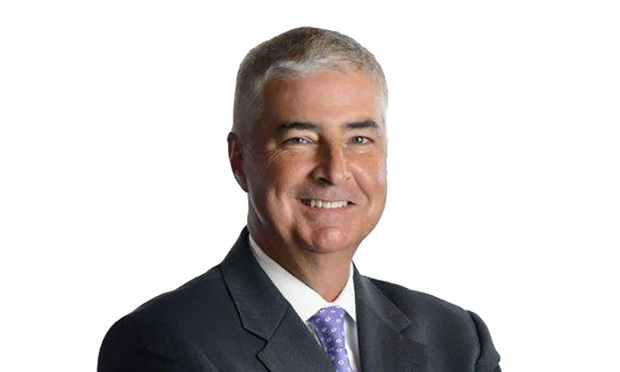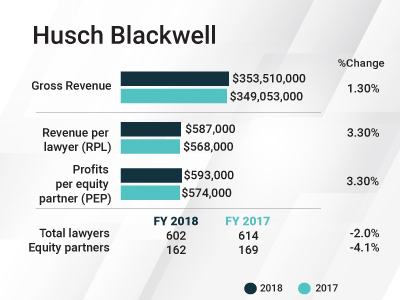Husch Blackwell Reports Increase in Revenue and Profits
The increases come as overall head count and the number of equity partners has declined.
February 28, 2019 at 04:18 PM
3 minute read
 Husch Blackwell's Paul Eberle
Husch Blackwell's Paul Eberle
Midmarket law firm Husch Blackwell reported an uptick in financial results for fiscal year 2018, with gross revenue increasing to $353.5 million from $349 million the year before—a gain of 1.3 percent. Revenue per lawyer rose 3.3 percent, from $568,000 to $587,000 over the same period.
Profits per equity partner also climbed 3.3 percent, from $574,000 to $593,000—but the gain came as the number of equity partners shrank 4.1 percent, from 169 to 162. Firmwide lawyer head count also dropped, from 614 to 602—a 2 percent decline.
“We characterize 2018 as a solid year in what continues to be a challenging marketplace,” said Paul Eberle, the firm's chief executive.
Eberle acknowledged that the strong revenue per lawyer figure is partly a result of having fewer lawyers vying for a piece of the transactional pie. The firm let 40 lawyers go in 2017.
Eberle cited the firm's energy and natural resources practices as a standout in the past year. Since establishing a presence in Houston in 2013 through a tie-up with Brown McCarroll, Husch Blackwell has added bench strength in Houston and now has 17 lawyers there. Recent additions include former city of Houston attorney Arturo Michel and former Harris County Judge Robert Eckels.
 Another sweet spot for Husch Blackwell has been litigation, Eberle said.
Another sweet spot for Husch Blackwell has been litigation, Eberle said.
“We continue to take on more work managing national litigation for larger companies that rely not only on our experience but our ability to manage complex litigation and our relations with local counsel across the country,” Eberle said. “Internal legal teams have been asking us to come in and manage large caseloads of litigation.”
Eberle noted that the firm saw a slight downturn in the volume of its restructuring work in the past year.
He also said the firm has no merger prospects on the horizon but the firm's leadership would not automatically say no to merger talks.
“Nothing is imminent, but we are certainly of the belief that we need to continue to grow and expand our reach geographically and expand the depth of our practices,” Eberle said, adding that the growth of the litigation practice, in particular, raises the prospect of opening doors in new cities in coming years.
Like many law firms, Husch Blackwell has made a massive investment in IT systems and training. The firm hires outside vendors and advisers to test its internal network, including through such exercises as sending phishing emails to employees in order to assess whether they can recognize suspicious emails as such.
“Our entire IT budget has increased in double digits in recent years, and we are moving more and more of our applications out to the cloud,” Eberle said.
The lobbying firm Husch Blackwell Strategies shares the name of the law firm, but its revenues are separately reported and do not figure into the gross revenues reported by the law firm, Eberle said.
This content has been archived. It is available through our partners, LexisNexis® and Bloomberg Law.
To view this content, please continue to their sites.
Not a Lexis Subscriber?
Subscribe Now
Not a Bloomberg Law Subscriber?
Subscribe Now
NOT FOR REPRINT
© 2025 ALM Global, LLC, All Rights Reserved. Request academic re-use from www.copyright.com. All other uses, submit a request to [email protected]. For more information visit Asset & Logo Licensing.
You Might Like
View All
Government Attorneys Face Reassignment, Rescinded Job Offers in First Days of Trump Administration
4 minute read


Energy Lawyers Field Client Questions as Trump Issues Executive Orders on Industry Funding, Oversight
6 minute readTrending Stories
- 1Doug Emhoff, Husband of Former VP Harris, Lands at Willkie
- 2LexisNexis Announces Public Availability of Personalized AI Assistant Protégé
- 3Some Thoughts on What It Takes to Connect With Millennial Jurors
- 4Artificial Wisdom or Automated Folly? Practical Considerations for Arbitration Practitioners to Address the AI Conundrum
- 5The New Global M&A Kings All Have Something in Common
Who Got The Work
J. Brugh Lower of Gibbons has entered an appearance for industrial equipment supplier Devco Corporation in a pending trademark infringement lawsuit. The suit, accusing the defendant of selling knock-off Graco products, was filed Dec. 18 in New Jersey District Court by Rivkin Radler on behalf of Graco Inc. and Graco Minnesota. The case, assigned to U.S. District Judge Zahid N. Quraishi, is 3:24-cv-11294, Graco Inc. et al v. Devco Corporation.
Who Got The Work
Rebecca Maller-Stein and Kent A. Yalowitz of Arnold & Porter Kaye Scholer have entered their appearances for Hanaco Venture Capital and its executives, Lior Prosor and David Frankel, in a pending securities lawsuit. The action, filed on Dec. 24 in New York Southern District Court by Zell, Aron & Co. on behalf of Goldeneye Advisors, accuses the defendants of negligently and fraudulently managing the plaintiff's $1 million investment. The case, assigned to U.S. District Judge Vernon S. Broderick, is 1:24-cv-09918, Goldeneye Advisors, LLC v. Hanaco Venture Capital, Ltd. et al.
Who Got The Work
Attorneys from A&O Shearman has stepped in as defense counsel for Toronto-Dominion Bank and other defendants in a pending securities class action. The suit, filed Dec. 11 in New York Southern District Court by Bleichmar Fonti & Auld, accuses the defendants of concealing the bank's 'pervasive' deficiencies in regards to its compliance with the Bank Secrecy Act and the quality of its anti-money laundering controls. The case, assigned to U.S. District Judge Arun Subramanian, is 1:24-cv-09445, Gonzalez v. The Toronto-Dominion Bank et al.
Who Got The Work
Crown Castle International, a Pennsylvania company providing shared communications infrastructure, has turned to Luke D. Wolf of Gordon Rees Scully Mansukhani to fend off a pending breach-of-contract lawsuit. The court action, filed Nov. 25 in Michigan Eastern District Court by Hooper Hathaway PC on behalf of The Town Residences LLC, accuses Crown Castle of failing to transfer approximately $30,000 in utility payments from T-Mobile in breach of a roof-top lease and assignment agreement. The case, assigned to U.S. District Judge Susan K. Declercq, is 2:24-cv-13131, The Town Residences LLC v. T-Mobile US, Inc. et al.
Who Got The Work
Wilfred P. Coronato and Daniel M. Schwartz of McCarter & English have stepped in as defense counsel to Electrolux Home Products Inc. in a pending product liability lawsuit. The court action, filed Nov. 26 in New York Eastern District Court by Poulos Lopiccolo PC and Nagel Rice LLP on behalf of David Stern, alleges that the defendant's refrigerators’ drawers and shelving repeatedly break and fall apart within months after purchase. The case, assigned to U.S. District Judge Joan M. Azrack, is 2:24-cv-08204, Stern v. Electrolux Home Products, Inc.
Featured Firms
Law Offices of Gary Martin Hays & Associates, P.C.
(470) 294-1674
Law Offices of Mark E. Salomone
(857) 444-6468
Smith & Hassler
(713) 739-1250










